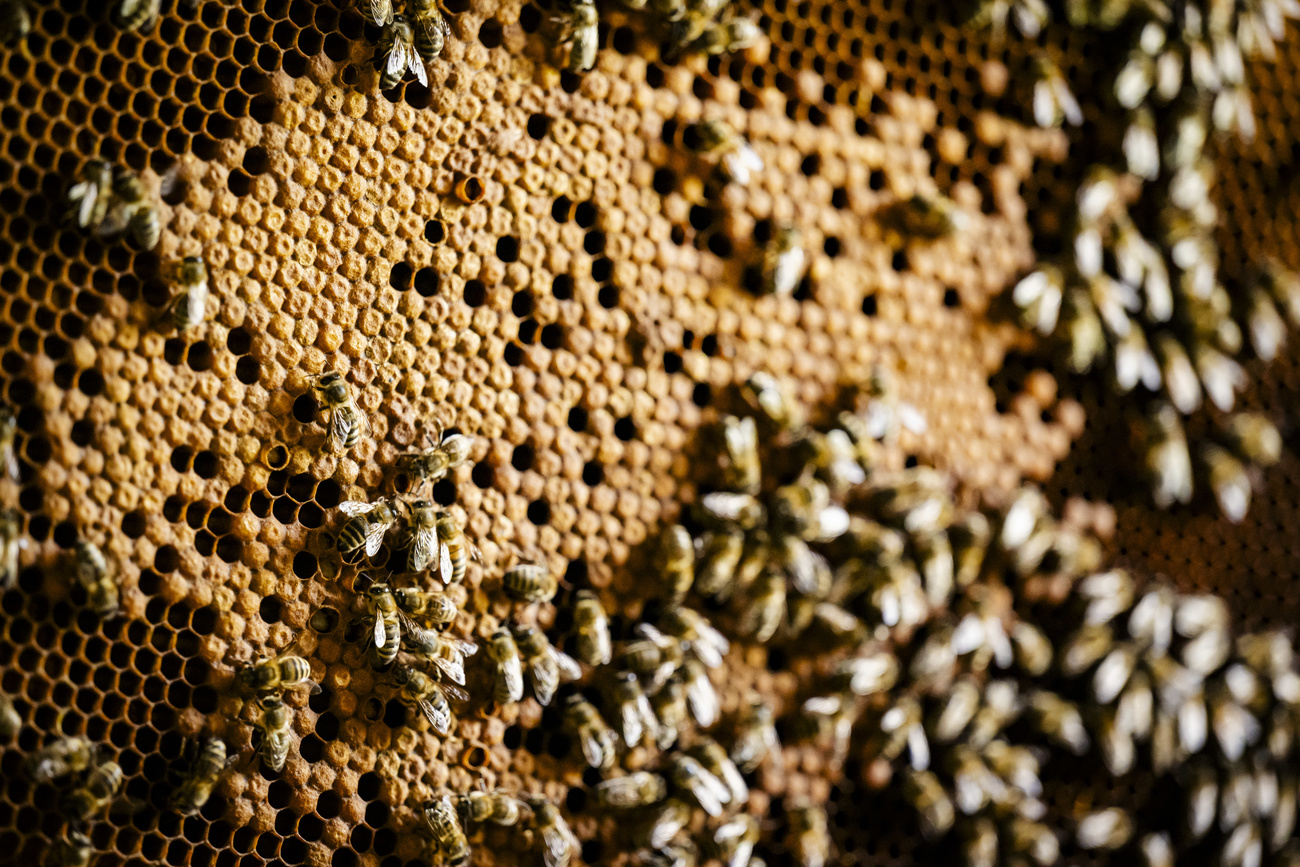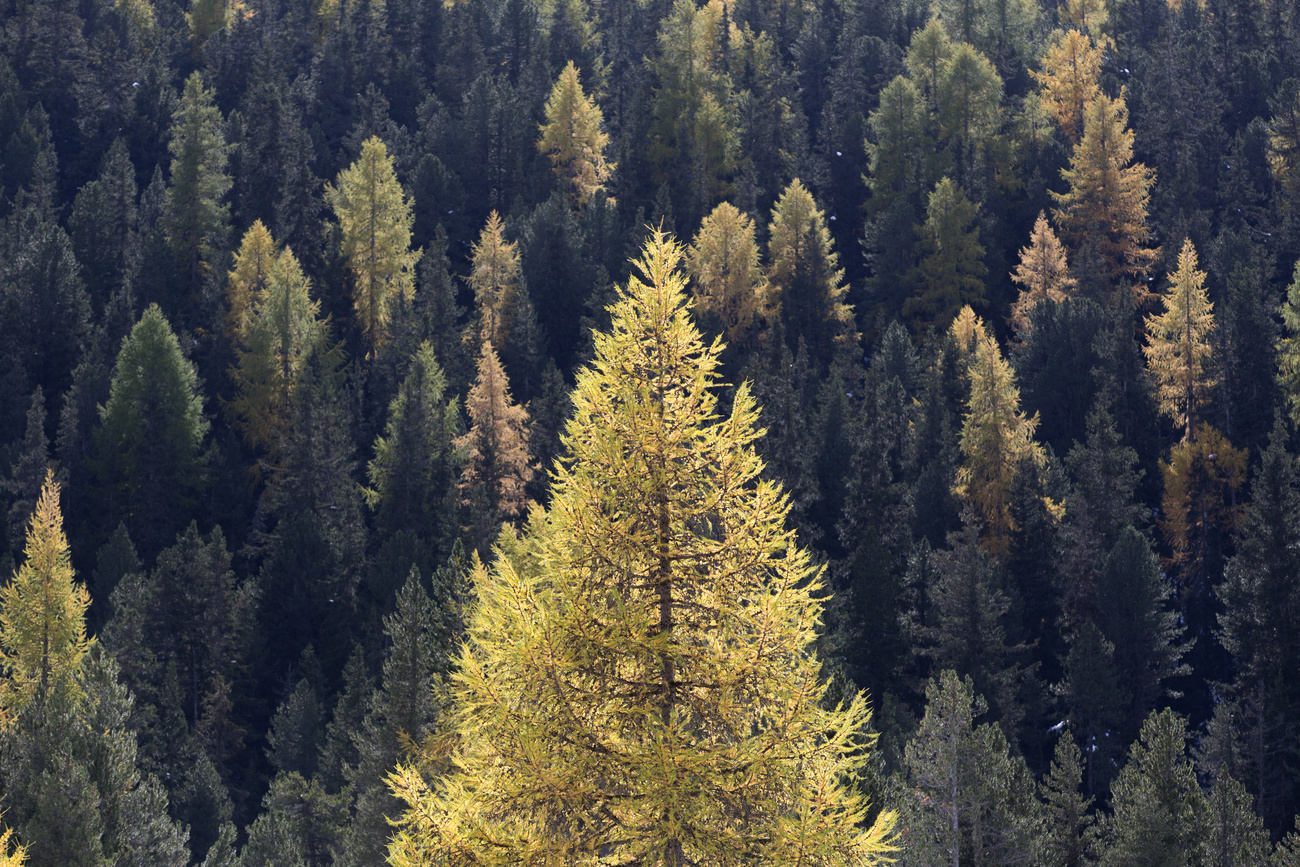
Swiss beekeepers struggle with solidified ‘cement honey’ crisis

Beekeepers across Switzerland are grappling with unusually tough honey this year, caused by a specific type of louse that solidifies the honey.
Heavy and hard like cement, this honey is being reported in several cantons, with the issue particularly severe in Aargau, as well as Schwyz and Lucerne. Known as “cement honey”, it becomes extremely hard within just a few days, making it impossible to extract. For affected beekeepers, this means a lot of effort for very little return. Despite this, the honey remains edible and is sometimes even sought after.
By the time beekeepers notice the problem in their hives, it is often too late. “Cement honey crystallises much faster. At first, you’re pleased with the honey yield, but then it becomes nearly impossible to extract,” says Edith Meier, honey inspector for canton Aargau and a beekeeper herself. The yield from cement honey is minimal.

A particular type of louse is responsible for this rock-hard honey. The louse produces a sugar that crystallises rapidly, which the bees then carry into their hives. More of these lice have been found this year than usual, contributing to the increased problem with cement honey, particularly in canton Aargau.
Cement honey is also known as melezitose honey. It comes from the honeydew of certain Norway spruce and larch lice. Depending on the species, the lice excrete a polysaccharide, melezitose.
If the honey in the comb has a melezitose content of over 20%, it can no longer be extracted. Agroscope, the federal centre of excellence for agricultural research, defines cement honey as crystallised forest honey with a very high melezitose content.
Affected areas: larch and Norway spruce
Edith Meier, who maintains around 50 bee colonies, notes that the honey varies by region. She has harvested cement honey in areas where Norway spruce trees are close to the bee colonies. These aphids are especially prevalent on Norway spruce and larch trees.

In canton Schwyz, it is mainly forest honey that is affected, according to various media reports. The problem is also significant in canton Solothurn this year, as reported by the relevant specialist centre. Switzerland is not alone in facing this issue; beekeepers in southern Germany and Austria are also affected, according to the Solothurn centre.
Bee health at risk
Cement honey is not just a headache for beekeepers; it also poses a risk to bee health. This honey is unsuitable as winter food for bees, as they require too much water to dissolve it. Cement honey is also difficult for bees to digest, potentially causing diarrhoea and leading to the collapse of entire colonies. Some bees have even exhibited movement disorders after consuming cement honey, according to the Swiss bee magazine.
Cement honey: edible and sometimes in demand
There are several methods for harvesting this tough honey, the most common being to heat it. “You can heat the honey, separating the wax and honey, but it mustn’t get too warm, or it will be damaged,” says honey expert from canton Aargau, Edith Meier. The honey can then be used as baker’s honey, though it is of slightly lower quality than conventional honey.
For consumers, 2024’s cement honey isn’t necessarily bad news. “In terms of flavour, it’s a very good honey. It has a granular texture, similar to semolina, which some people enjoy,” says Meier. So, while it can be sold, it requires significant effort to harvest.
Adapted from German with DeepL/amva

In compliance with the JTI standards
More: SWI swissinfo.ch certified by the Journalism Trust Initiative


























You can find an overview of ongoing debates with our journalists here . Please join us!
If you want to start a conversation about a topic raised in this article or want to report factual errors, email us at english@swissinfo.ch.